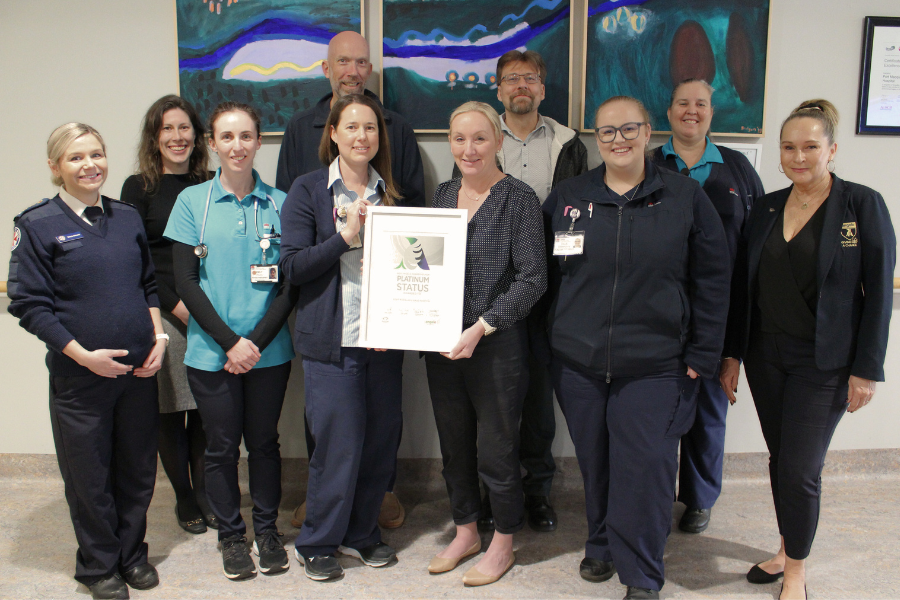
Some of the award-winning team making a difference every day for stroke patients: Tahlia Collins from NSW Ambulance, Jenni Steel Stroke Care Coordinator, Emily O’Rourke Stroke physiotherapist, Dr Matthew Kinchington Head of Medicine (Stroke Physician), Stephanie Barber Stroke Clinical Nurse Coordinator, Dr Dawn Martin Head of Emergency Medicine, Matt Hoffmann Acting District Manager Allied Health, Elle Debreceny (Nurse Unit Manager 3D/Medical Assessment Unit and Acute Stroke Unit), Michelle Coad Stroke Dietitian, Sam Degasso Stroke Care Program Specialist Angels Initiative.
International recognition for stroke treatment and care
Aug 01, 2024Port Macquarie Base Hospital’s stroke unit is celebrating a sixth international award for meeting the highest standards in stroke treatment and care.
The prestigious World Stroke Organisation (WSO) Angels Platinum Award follows the hospital attaining WSO Gold Status earlier this year. Port Macquarie Base Hospital is only the fifth hospital in Australia to receive the coveted Platinum ranking.
The Angels Initiative, a partnership between the World Stroke Organisation, European Stroke Organisation and Boehringer Ingelheim, aims to optimise the standard of treatment in stroke centres worldwide and improve patient outcomes by setting global benchmarks for best practice care.
Port Macquarie Base Hospital Stroke Care Coordinator Jenni Steel said achieving WSO Angels Platinum Status was an enormous honour for the entire team.
“We were thrilled to achieve WSO Platinum Status and are even prouder to see the hospital improve upon that benchmark so rapidly,” Ms Steel said.
“This new award recognises our combined efforts and commitment to improve stroke care in the community.”
Port Macquarie Base Hospital treats approximately 275 strokes each year. Training, protocols, and the performance of the hospital’s stroke unit were assessed as part of the Angels Initiative. For WSO Platinum status, this includes a target of restoring blood flow to the brain to more than 75 per cent of eligible patients within 60 minutes of their hospital arrival.
“Stroke is a time-critical medical emergency where blood supply to the brain is interrupted or reduced. With every passing minute brain cells can be lost and the risk of disability and death increases,” Ms Steel said.
“Acting swiftly on the signs of stroke and implementing best practice care requires almost seamless coordination between ambulance, emergency department, radiology, and stroke unit staff.
“Ensuring appropriate patients receive clot-busting therapy within 60 minutes of arriving at the hospital door requires extraordinary teamwork and consistency but means that more people will survive and live well after a stroke.”
In regional Australia, rates of stroke are higher and health systems must contend with the challenge of providing access to treatment and care over significant distances.
A major report by Deloitte Access Economics, commissioned by the Stroke Foundation, highlights that people living in regional Australia are 17 per cent more likely to suffer a stroke than those living in metropolitan areas.1
To achieve WSO Platinum status, a hospital must demonstrate a range of outcomes, including optimum time to treatment, coordinated care, appropriate scans and screening, and ensuring patients are discharged from the hospital on medications to minimise the risk of further stroke.
The Angels Initiative Medical Project Manager in Australia Kim Malkin said every step toward improving care and outcomes for stroke patients was worth celebrating, as there were approximately 38,000 stroke events across Australia each year – around 100 every day.2
“To date, only a handful of Australian hospitals have achieved WSO Angels Platinum status so Port Macquarie Base Hospital should be immensely proud of this achievement,” Ms Malkin said.
Achieving WSO Platinum status is not possible without the incredible efforts of onsite staff, however, data and technology play a vital role in modern stroke care.
As a Telestroke Service site, Port Macquarie Base Hospital has 24/7 access to lifesaving stroke diagnosis and treatment by connecting local doctors to specialist stroke physicians via video consultation in the emergency department.
Dr Matthew Kinchington, PMBH Head of Medicine and Stroke Physician said the Mid North Coast Local Health District’s consistently positive outcomes were a source of pride for the whole team.
“Achieving great outcomes for patients is due to the teamwork from paramedics who notify the emergency department of the stroke patient coming in, through to all the staff who work quickly to treat the patient, including stroke specialists in the NSW Telestroke Service who are on video consultation with us, the patient, and their family,” Dr Kinchington said.
“We are proud that our teams consistently achieve the global benchmarks for best practice care.”
About stroke in Australia1
- A stroke occurs every 19 minutes.
- There are 445,087 survivors of stroke living in Australia.
- 8,703 Australians will die because of stroke this year.
- The economic cost of stroke exceeds $6.2 billion, with a further $26 billion in lost wellbeing due to short and long-term disability, and premature death.
- Reducing uncontrolled high blood pressure and providing quicker access to emergency stroke treatments can save $179 million over five years in economic costs and$2.4 billion in reduced mortality and improved wellbeing annually.
References
-
- Deloitte Access Economics – Stroke in Australia – No Postcode Untouched, 2020. Available at: https://strokefoundation.org.au/en/News/2020/11/04/02/57/No-Postcode-Untouched.
- Australian Institute of Health and Welfare. Stroke Snapshot, July 2020. https://www.aihw.gov.au/reports/australias-health/stroke

